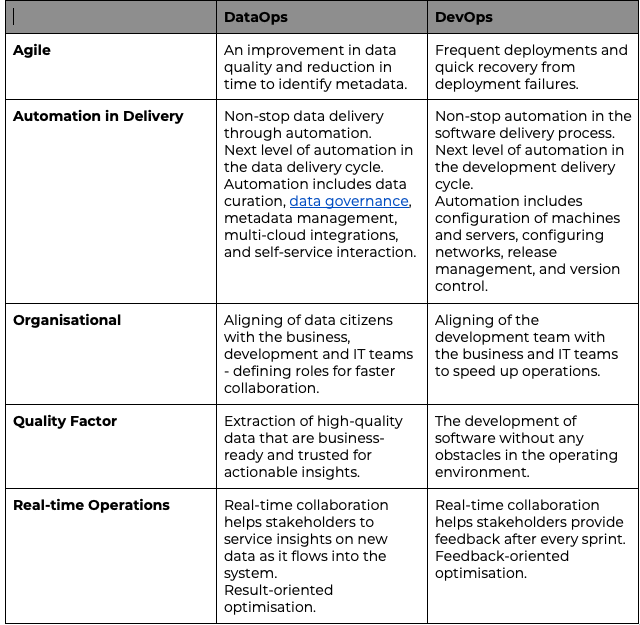DevOps has emerged as a successful practice optimising the product delivery cycle through the years. As time has passed and more and more enterprises around the globe have begun to focus on building a data-driven culture, it has become more and more necessary for the product delivery cycle to be built properly for companies to reap the most benefits from their business data. After all, understanding your business data means having the right factual insights to help with your decision-making rather than just relying on assumptions.
We will take a deeper look at DataOps and DevOps in this article, but let’s start with a simple explanation of the differences from Alation: “DevOps focuses on product development, DataOps aims to reduce the time from data need to data success.”
DevOps concerns development, engineering and IT operation teams who are charged with reducing the cost and time spent on the development and release cycle. DataOps, on the other hand, deals with data, and the focus is on acquiring, transforming, and modelling the data to acquire actionable insights.
Collaboration between the DevOps and DataOps teams is vital to help with continuous integrations and delivery of automated processes in workflows.
DataOps is changing how businesses handle data in the same way that DevOps transformed how the software development cycle worked.
DevOps and DataOps workflows
DataOps workflows focus on integrations, business and insights, whereas DevOps focus on software development, feature upgrades and fix deploying. Although the elements they work with are different, their core operational strategy is very similar.
The workflow for DevOps tends to be:
- Goal setting
- Developing
- Building
- Testing
- Deploying
Whereas for DataOps, it is:
- Goal setting
- Gathering resources
- Orchestrating
- Modelling
- Monitoring
- Studying
DevOps and DataOps principles
DevOps focuses on collaborative learning, enabled by short feedback loops, which are facilitated by the use of agile principles throughout the organisation.
With DataOps, however, data tends to be the element that differs from DevOps, although both DataOps and DevOps are based on agile methodologies. In DevOps, for example, the desired outcomes may not be able to be developed over time, so some processes can become stagnant before a tester or the person who deploys them is reached.
Minimising the steps from the feedback loop and delivery cycle reflects real-time connectivity within teams, which can help with goal setting.
Lean processes are the best way for businesses to extract the most out of their data – especially ones that take into account a series of quality checks before data modelling commences. This will then ensure any data anomalies that disrupt the flow of operations are filtered out so that they don’t damage the end user’s confidence in the data and the insights they achieve from it.
A round-up of the main differences between DataOps and DevOps:

Get in touch if you want to get into DevOps or DataOps. Agile Recruit is the leading cloud and data recruitment agency in the UK.
Be the first to apply for the latest DevOps or DataOps jobs – get alerts with the latest jobs sent directly to your inbox.




